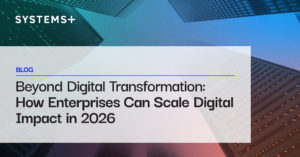How will Web3 and the Metaverse revolutionize the future of retail and e-commerce


With
Co-founder at Tigerfeathers Building for Web3
Enabling digital is leveraging technology to create new business models, new products and services, and new strategies and ultimately drive business growth.
The podcast series explores how CIOs can capture opportunities by looking at and beyond technology and data to propel their organizations into the digital forefront.
The podcast series looks at how independent thought leaders and visionaries from the tech industry across the globe bring their ideas to scale within the business world, sharing innovative, path-breaking insights with our listeners.
We interview experts on trends and best practices for IT leaders. Sapan Choksi, CEO at Systems Plus, talks monthly with tech thought leaders on 21st century business topics like innovation, digital transformation, AI, and automation.
We are excited to be in conversation with Rahul Sanghi on ‘How Web3 and Metaverse will revolutionize the future of retail and e-commerce’, as part of our Enabling Digital podcast series.
Rahul Sanghi most recently served as Fintech Lead for Visa in India & South Asia. He began his career as a consultant with KPMG in London, spending a majority of his time helping the firm set up its global enterprise blockchain and crypto asset advisory practice. He moved back to India in 2018 and joined Koinex (then India’s largest cryptocurrency exchange) as Director of Business and Strategy, before assuming the same role at B2B-SaaS startup FloBiz. He is currently the co-founder of Tigerfeathers, a media brand that is being built for Web3.
: https://www.linkedin.com/in/rahul-sanghi-1b919984/
Sapan Choksi 0:00
Hey, everyone, welcome to enabling digital with Systems Plus Podcast Series. Today we have a very exciting speaker where we talk all about Web3. It's a super exciting discussion. And I'm really looking forward to talking to Rahul Sanghi. He is he's extremely well versed in this area. But before we dive into the details, I would love to hear a little bit of background so people understand, you know, where you've been, what you're doing, etc. And then we can dive into the details.
Rahul Sanghi 0:51
Okay, awesome. Thanks, everyone. And thank you guys for having me. So I've been in this space for a few years now. I got interested first in Bitcoin back in 2015. And went down the rabbit hole then and never came back out. I was working as a consultant at KPMG in London at the time. And it just so happened to be the case that the sort of broader tech landscape was fully fueling the blockchain, Bitcoin narrative, or the idea that enterprise blockchain solutions would be the sort of real use case that unlocks the potential of blockchain technology as opposed to sort of maybe, “speculative crypto-assets”. So I got interested in the space back then and spent a few years sort of helping our big clients understand what blockchain was, how their systems could potentially be re-architected with a blockchain at the center, or just in general, where or how they should sort of incorporate this sort of piece of data into their future planning. I did that for a few years and came back to India in 2018 to join Coinx, which at the time was India's largest cryptocurrency exchange as their sort of head of business strategy. And obviously, if you've been paying attention to this space, you know that in 2018, the sort of government of India was even more antagonistic to crypto than it is now. So, we, unfortunately, had to pivot out of that business. So, a b2b SaaS company called FloBiz that I left in May of 2020. I did a sort of one-year stint at Visa, helping to lead their FinTech practice in India. And I'm now sort of trying to convert or try to use my newsletter as the first step to building a much larger media ecosystem. And I've spent the last couple of years going deep into NFTs and trying to sort of unpack what is hype and what is not where this sort of exciting world of web 3, and crypto is concerned. So I don't know. It's like a slightly longish background, but I hope that gives you an idea.
Sapan Choksi 2:53
That's awesome as actually, it's fantastic. I wish I could have you on my team, to be honest. And everyone who's listening, please check out his blog at Tiger feathers. It's really informative. So Rahul, you touched on a bunch of words, Blockchain, crypto, etc. I think those are all aspects or enablers to the web three is enablers to due to these things, but before we even sort of get to some of the details, what is the web 3 all about? I mean, people just have been throwing the word around a lot lately. So help us understand that a little bit more, and also, what is the role that the metaverse has to play within it? Because I think people have been talking as though Metaverse is the web three, but that's not quite it, correct?
Rahul Sanghi 3:43
Sure. So yes, that’s completely fair. And unfortunately, this, this entire space, just loves this jargon way too much for my liking. And we tend to confuse people on the outside of people who want to get involved. So quite simply, web 3 is the sort of umbrella term for the next iteration of the internet. And over the last, say, 12 to 18 months, it's become the sort of de facto term to describe this entire universe of crypto and blockchain technology, and how that will play a role in re-architecting the internet using or replacing central databases with public blockchain platforms, which essentially function as public globally distributed databases. So, when you say the metaverse again, that term has, there's no sort of textbook definition. The term actually traces back its origins to a fantastic sci-fi novel called Snow Crash by Neal Stephenson in the 90s, where the sort of simple explainer is that the metaverse represents next-gen social media. So instead of our 2D news feeds, the idea is that we will replace that sort of static UI with a much richer 3D interface where the social activity on the internet almost resembles that of an online game, where we're actually sort of interacting with people in a 3D setting, ideally with 3D hardware. And essentially, that's the way we interact with each other online. Now, the promise or the hope from at least the crypto, the crypto enthusiast is that this Metaverse will correct some of the missteps we've made with the last 10 to 15 years of the internet, where we've largely ceded all power to central companies and large internet giants like Facebook, Twitter, and Amazon, who represent the first port of call for the web in many ways. So, they represent the starting point for most internet users. And they've done such a great job of building network effects, that we happily volunteer our personal data in exchange for using these services often for free, unaware that our data is being used and harvested to serve the interests of advertisers. So, the hope is that this web 3 world will be built on a more equitable ground, on top of public blockchain platforms or public databases that no one really owns. And that's the main difference between web 2 and web 3 is that the data layer of the internet is not owned by a central party, which poses all sorts of interesting questions about where value in this new domain will actually percolate towards.
Sapan Choksi 6:33
Makes sense, that's perfect is perfect. But I imagine that Facebook, Google, etc, will still have a role to play a significant role to play in the web 3.
Rahul Sanghi 6:42
Yeah, 100%. And you've seen, say, six months ago, that Facebook or Meta. But I mean, again, like the name should suggest they've seen the writing on the wall. And I think, at least for me, it's important to contextualize the entire crypto wave from the larger social context. So, in terms of reducing trust in institutions, or a desire for greater individual privacy or desire for data ownership or control over one's data. And so, I think these larger companies are seeing where that consumer trend is going. Again, it may not be that the 100% of the Internet user base is sort of hip to the new agenda. But there are a certain number of users who desire a better standard of service from our internet overlords, essentially. So, to your question, of course, all of these larger companies aren't just going to cede this territory to newcomers or to this new paradigm without a fight. So, you've seen Facebook, for example, one change named a matter indicating that they see where the story is going. The difference is that because of their I guess web to DNA, if you want to call it, they do still have the same hopes of controlling the entire user experience of maintaining high switching costs for users. So what that means is, if you are logging into Facebook, or Facebook Metaverse, in this instance, you will still maybe need to use your Facebook credentials, your Facebook username, and password to log in, which means that they still have control over your data or view your data, in most cases without your consent, and can do whatever they want with that. So, all of these web two companies are largely data companies and have made their business models on the back of being able to convince users to volunteer their personal data. So although you will see the old Internet giants, experimenting with these new platforms, or experimenting with these new design contexts, I still think that unless we embrace the use of web 3, which means that a certain amount of your absolute control over the consumer experience, you might eventually lose out to more decentralized players, if the decentralized startups can offer a UX and a UI that is at par with what we become accustomed.
Rahul Sanghi 9:11
You have touched on a very interesting point. I mean, in the last five years, everybody's been sort of touting the fact that data is the next oil. Right? And as you sort of, rightly label alluded to, people like Facebook, Google, etc, they pretty much own pretty much everything that we do know and probably more than that. So do you envision that as we get into the web 3, over the next couple of years, that and through that decentralization process, we will start getting more control of our data or and therefore, these companies will sort of become a little bit less powerful and therefore the currency that they sort of hold of us or the valuation that they hold of us, diminish or on or that is that not the case?
Rahul Sanghi 10:02
So, I think it's a very fair question. And I don't claim to have sort of, I don't even know how exactly this will all play out, just because of how sensitive the position of crypto is within the broader or macroeconomic landscape. The fact is that we are dealing or at least the origins of crypto are traced back to Bitcoin, which is intended to be decentralized money. And that right off the bat is a scary proposition for sovereign governments to consider. And as that same ethos has expanded to the wider tech spectrum or divided tech ecosystem where we started to work on use cases, but beyond decentralized money, those same sorts of regulatory challenges, if you want to call them that will have or will have a bearing on the ultimate success or the importance of web three within the broader internet landscape as well. But you made a point about control over one's data, I think that ultimately comes back to control over one's identity. And the main difference between web two and web three is that your identity and your entire sort of internet experience starts with your crypto Wallet. So that becomes the new atomic unit of the internet. That's how you present yourself online. It's not by your username and password, it's rather by what you own in your wallet. So, whether that's NFT's or fungible in the currencies, whether that's a domain name on the Ethereum blockchain that neatly cards to you. So, it's a that's the biggest flip from my perspective is, that instead of using centralized credentials that are ultimately owned by a tech company, you're using a wallet as your username and password, which uniquely belong to you, which you have unique ownership and control over. And then it becomes Okay, what does that mean for the rest of the internet in that case? So, if you're not recognizing users by that data trail, then how do you sort of offer services? Or what kind of new services can you offer users based on the fact that you now recognize them by their wallets, or their public addresses as opposed to a username and password in the old world.
Sapan Choksi 12:22
So, to me, an interesting point you raise but before I get to that, can you dumb down crypto for us? Because most people think crypto means Bitcoin. But it's obviously it's definitely a lot more than that. So, if you could just, you know, give us a one-minute or two-minute primer on what crypto is and what it represents as a niche.
Rahul Sanghi 12:45
Sure. So, when I think when people say Crypto they tend to mean the entire ecosystem of technology ecosystem of crypto assets and blockchain technologies. And that makes up or that means it includes Bitcoin itself. It includes public blockchain platforms that are essentially sort of general-purpose computing platforms that you can create decentralized applications on top of so like I sort of mentioned before, and I'm sure some of your users are aware that instead of these instead of databases managed via Facebook or Twitter, these databases are distributed across a number of computers that are running this open-source software, and a crypto token is just a unit that represents some value online. So, whether that value is a sort of currency, unit of a currency within the context of a monetary system, whether that token represents a lot of digital land, whether it represents a digital collectible, it's almost like these versatile units of software that can be used to represent different things in the context of different networks. Does that make sense?
Sapan Choksi 14:01
Yep, absolutely. Thank you. So then, how do businesses, especially retailers need to start thinking about the Web 3?
Rahul Sanghi 14:11
Again, so it comes back to the wallet. That's the sort of starting point. Because for retailers and for brands, at least in the last year, that has meant experiments with NFT. I'm sure a lot of your listeners, I'm sure you've seen almost every sort of major brand in the world has tried to experiment with NFT's which are, in essence, a way to represent a unique digital good or to be sort of technically specific it's a certificate for a unique digital asset. It's a way to record the existence of a file on a blockchain. So that file itself can represent any media it can represent a picture of a pixelated ape, it can represent a video a song, a ticket to a concert, an item in a video game, so If these are the sort of, or non-fungible tokens are these unique digital goods that have in my opinion, and of course, lots of other people's opinions, expanded this sort of Canvas for digital commerce and digital creativity. So what we've seen in a practical perspective in the last 12 months is many brands start to offer digital goods to their customers. And because these goods are in essence programmable cryptographic tokens, it means they can come with certain properties and functionalities that we weren't able to do before or that we weren't able to offer before. So, for example, Gucci can offer you a digital handbag that you can purchase for whatever reason, that also doubles as your ticket to enter a real-life event. Or it doubles as your entry pass, to attend an online say one on one session with a famous designer. So, for retailers, these tokens represent a different canvas on which to conduct digital commerce. And obviously, because they are digital, you do away with a lot of the supply chain challenges and costs that you would in an era of physical copies. So of course, if you can crack it, if you can offer, say, a digital experience using these new tools that you weren't able to do before, then you expand, your revenue potential, and you also expand the types of users that you're drawing to your brand that may or may have not been exposed to what you were doing before.
Sapan Choksi 16:34
Yeah, that's pretty cool. So fundamentally, it's a way for retailers as an enabler for retailers to connect directly to the consumers instead of through third parties, or some such thing.
Rahul Sanghi 16:44
I presume, exactly. So, it's on your website, you just assume that a wallet is a new input for developers who are creating websites or creating any kind of online commerce interface. Because now if I can come, if I can show up on your website, and I have a Systems plus NFT, in my wallet, that means that I can chat with one of your lead engineers once a month because I hold your NFT. And that's part of the deal you are offering, then that means that you're offering a new line of digital services to me, and maybe there's a new line of revenue to explore on that front as well. So, it's a different internet experience where you can have complete ownership from a consumer perspective, I have complete ownership over my identity because I have complete ownership or I have complete control over the private key that manages my crypto wallet, where I hold my cryptocurrencies, my NFTs, some of which are art, some of which are tickets, some of which are subscriptions, whatever the case may be. So, it's sort of flipping the equation around on how we typically do online commerce.
Sapan Choksi 17:50
So, tell me something, I would like your opinion on this. How do you see crypto playing out in the next two years or five years? But the caveat I'm going to throw here is that in the end, all currencies, etc. It's all about the belief system that people have in it, and there are people who believe that it exists. And if enough people don't believe in it, it doesn't exist. So, is crypto getting enough of a momentum that people believe in it? And therefore it will exist? Well, it does exist as we have seen it, but that it will, it will gain some ground, etc. So how do you see that playing out in the next two to five years?
Rahul Sanghi 18:26
It’s a very fair question. So, I would sort of add another point to that is that fundamentally, what blockchain technology allows you to do is it allows you and of course, the accompanying crypto assets allow you to do is to see the network in a different way than we're previously used to in web two. So, in web two, if you wanted to build a social network, or even an E-commerce network, for that matter, in many cases, you weren't your starting point was your social graph. So, you're bringing your actual social graph, your friends, and your family, into these online applications. And because your social graph was now present in these networks, where you spend your time, you were more incentivized to stick around within the same applications that all your friends and family, and work colleagues were using. But in this sort of web 3 paradigm, we are seeing networks using crypto tokens that add a financial incentive for people to want a particular application or platform to succeed. Now, on one hand, that's an interesting and different perspective to doing this. And in some cases, it does work as we've seen with Bitcoin, it's essentially magic internet money, that because obviously, the strength of the technology and the elegance of the system design coupled with the fact that people are incentivized to bring in more users to the system or to espouse the virtues of this system. Just the fact that Bitcoin exists 13 years or 14 years later, is amazing in itself, and it is one validation that this theory of network design can work. Now whether that same sentiment or the same ethos can work when you're building other decentralized applications or other networks remains to be seen. And it's, it's often why it's very easy to criticize crypto as being just a sort of the fountainhead of a speculative mania. Because once the price of a certain crypto asset falls, we've commonly seen people's interest in that network or that application or that platform fall as well. So I think that's the challenge that needs to be sort of figured out is, can we construct these systems in a different way, where the incentives don't change the utility of the network, just because most people participating on a platform or in an NFT collection for that matter, are speculators so I think that's, that's primarily the what we have to figure out is we have to pass the speculators from the innovators and the users in this system. And I think that's the main challenge of this entire space over the next few years.
Sapan Choksi 21:01
That's pretty, pretty interesting. So, I mean, you hear all these anecdotes about, you know, people paying boatloads of money to have the house next to a famous rapper, that was extended, all that kind of stuff. Right. So with that said, of course, there will be many anecdotes, you know, up and up real live examples where, you know, people like Elon Musk, this tweet saying, we're not going to accept Tesla's are going to accept Bitcoin anymore, and all of a sudden Bitcoin value drops. So yeah, that seems to indicate that is if people could swing these values, you know, significantly. Now, having said that, do you? Do you see, sort of the big, big names, etc., really dictate the way sort of this goes? Elon Musk, I get it. It's a big name. But there are obviously a lot of other players in this right? Or do you fully expect that there will be that network that the network effect will actually take care of itself and just make it a more viable and stable means of a currency?
Rahul Sanghi 22:15
So again, you correctly pointed out just the fact that people are buying and selling assets based on what Elon Musk tweets out, it's sort of one good indicator of how immature this market is, and definitely how immature it can be. And of course, it's not helped by the fact that I guess the nature of these public blockchain platforms means that anyone in this world can participate in these sort in this in this economic landscape, anyone who work and use this technology set to build out new applications, that may be completely useless, maybe completely speculative. So one, there is a certain immaturity in the market from that perspective. You have to consider the fact that a lot of what we've seen in the last year, especially when it comes to Metaverse, real estate, and things like that, a lot of it is hype. And a lot of it is companies experimenting to see if there's anything for real out there. So back to I guess the question you asked me at the start as to what the metaverse is, it's just next-gen social platforms or next-gen social-economic platforms that are meant to be enjoyed in the 3d setting. So for right now, buying virtual land, the analog you can draw, it's a way of reserving your space in the new Facebook a way of buying a profile on the new Twitter. And because we have, for whatever reason, use land, that point is just as almost ridiculous in itself as you because it's like we had the chance to create these virtual worlds in any way that we thought of. And obviously being the sort of silly humans that we are, we literally wrapped up replicated land as the best analog for how our digital spaces should look. So I'm long term probably bearish on that, in that why should we construct these spaces being constrained by the laws of physics when we can have the complete freedom of imagination to decide what these online spaces should look like? Beyond just like walking around on something that looks like what looks like outside your window? So, I don't know. I think I lost track of your original question. But I guess my point is one, the market itself is a little immature. And two, is all of these brands that are experimenting with buying lands in the metaverse or like JP Morgan, for example, set up a digital office on this Metaverse platform called Decentraland. But this is just to sort of signify where the attention is. So these brands and these companies want to appear hip. So they want to be whether users are aware the sort of general interest or the coolness of the tech world is swinging towards. I think that's swinging back though I would be fair to say now as prices drop across the board, some of the hype diffuses in the market. So, I would say just one is just there's it's important to separate hype from reality, and we are at the end of a bull cycle. So, a lot of those actions, a lot of those headlines from last year will prove to be just that just sort of instant PR dopamine hits that ultimately will not see a sustained action in that regard.
Sapan Choksi 25:25
That's a fair point. So then, do you see the metaverse becoming enough of a reality? That it will replace physical stores when it comes to at least non-consumable goods?
Rahul Sanghi 25:41
No, I don't I don't think that's the case. Because ultimately, you're it's just it's just that the metaverse or Dell represent 3d social networks or web three social networks. So you can answer that same question as to, there's probably a limit to how much time you want to spend online or anyone wants to spend online, regardless of how great the experiences that being said, you know, I know Marc Andreessen from Andreessen Horowitz has a like a great way of conceptualizing this, he calls it reality privilege, where he says that it's very easy for people in the developed world, or places where they don't have economic and social turmoil to say that, hey, people shouldn't spend so much time online. But for the vast majority of the world, the internet is probably or in many cases, a better space than your physical domain, both in terms of the economic opportunities it affords to you as well as the potential for socialization, as well as just your maybe day to day experience and, and how you go about life. So you have to wait along those lines. And that's a view that I subscribe to is that it'll differ for different people and different parts of the world. But it's hard to see everyone's spending all of their time online, what I do think will happen and definitely has happened in the last 12 months, or maybe even the last half decade. If you count the sort of E gaming space as well, is the way people value natively digital experiences are natively digital assets that I think has changed and will continue to change. That's the bit that's the sort of biggest shift that I see is that people will sort of have a more intuitive understanding for why this digital object should have value. And that's because using a blockchain, you can sort of verify that something is scarce, you can verify or you can authenticate the provenance or ownership of digital goods. And that opens up the the sort of opportunity to extract economic value from the digital goods as well. That's something we haven't been able to do. And that's something the NFT space and web three has opened up that I don't think is high. And I think we are very, we are very much at the start of that, that ship. So I don't think again, I don't think it means that everyone will start spending all their time roaming around these virtual worlds. But I do think the way, I do think the amount of attention and economic output, that the internet commands will exponentially increase, just because we now have a way to represent digital goods by lefties.
Sapan Choksi 28:19
So then just want to have a follow up on that. And is that today we have ecommerce, right? And we are buying goods, which we physically can't touch, right? And the metaverse takes it to another level where you actually sort of have theoretically can touch and feel it or whatever in your mind. Or you can see the 3d effects, etc. But when it comes to e commerce, we're still not able to physically touch the code versus buying, you know, just loads and loads of stuff. Today, as you shall see it, so do you so I presume the metaverse will just be more of an enabler to retailers, etc. Or, you know, maybe not, maybe not a sort of replacement software. So I mean, it's that sort of the way you see it, and also, how do you think retailers especially because those are the readers are normally wants to touch the consumers first, right? So we need to start thinking about not only things like Metaverse, but also the way they interact with consumers through this new web3 concept.
Rahul Sanghi 29:44
So the first way I would suggest anyone that wants to experiment or evaluate these, this sort of new design space would be is to start off understanding that people there's a sort of new segment of consumers on the that day, and those people are the ones with crypto wallets. And they have crypto assets that allow them to interact with websites or allow them to interact with online applications in a way we couldn't before. So one is that, and two is specifically with regards to NF T's. There's many mental models you can use to sort of assess how to get involved in this space. Because fundamentally, an NFT is just a digital template that you can infuse any kind of meaning or any kind of media or economic value into. So for example, the same way that if you had a football team, if you supported a football team in the real world, you would buy a football jersey, because that's part of your identity. And that's the way you want to flex your affinity towards this brand. In the same time, and it's in this in this sort of sort of drawing a parallel to the virtual world. If we do end up interacting on these social platforms, where we can show off or I guess, display our digital goods, and the old world, that really didn't mean anything, because one, you were doing it within the walled gardens of, say, gaming platforms like fortnight, or social platforms like Facebook, where all those sort of quote unquote, digital assets were owned by the platform you were using. But in web 3, ideally, you would have an NFT, that your say, Chelsea Football Club offered you, a NFT, have a digital jersey, that you could carry with you across all the platforms that allow you to connect with a digital wallet. And that asset is uniquely yours. That asset, in most cases is freely tradable on a secondary market, which means that there's constant price discovery of this digital asset you hold. And the idea that you can own it and take it with you across the internet. So you can easily see why that immediately would have huge uses for someone that was designing a loyalty program, where a large percentage of the world's loyalty points are, it's a dormant asset because people don't know how to use it, people don't know what it's worth, or you don't know how many of what their loyalty points are actually worth, how to exchange it, how to redeem it, how to value it, and doing it via these crypto tokens on a 24/7 liquid market. Again, there's pros and cons to that. But just the idea that you have transparency and value of digital assets in a way that you didn't before. That's something that I think is worth exploring. So when you when you talk about the mental models for NF T's, of course, digital merchandise is one of them. So just a way for brands to expand the range of their offerings, just the same way that they have, say, you can have a Nike, Penn Jersey shorts, or etc. You can have digital versions of all of those that again, it depends on people and how they want to value those things. I think we’re at the start of this sort of digital wave where people understand that natively digital objects can hold value in the same way that our physical objects do. So I expect that trend to accelerate. We've seen already people spend boatloads of money on virtual items, and cosmetic items in the gaming forays. But I think that will become commonplace for the wider social internet as well.
Sapan Choksi:
Awesome, that’s a great analogy. Thank you so much. I could sit here and ask you many more questions but we are out of time. So, Rahul, thank you so much for an absolutely amazing discussion. I have been enlightened for sure and I am sure our listeners would be for sure.
Rahul Sanghi:
Thank you so much. Hope it was useful and hope your audience enjoys. And if anyone does want to chat more about this stuff you can find me on twitter and our newsletter at tigerfeathers.com.
Sapan Choksi:
Thank you so much, Rahul. Thanks everyone for listening.




Amazon Web Services
Know MoreAmazon Web Services
Know MoreAmazon Web Services
Know More

